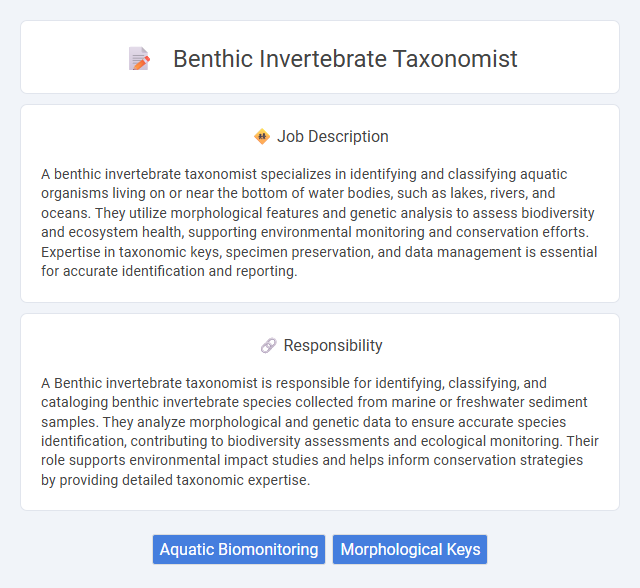
A benthic invertebrate taxonomist specializes in identifying and classifying aquatic organisms living on or near the bottom of water bodies, such as lakes, rivers, and oceans. They utilize morphological features and genetic analysis to assess biodiversity and ecosystem health, supporting environmental monitoring and conservation efforts. Expertise in taxonomic keys, specimen preservation, and data management is essential for accurate identification and reporting.
People with a strong attention to detail and a passion for aquatic ecosystems are likely to be suitable for a benthic invertebrate taxonomist job. Those comfortable working in laboratory settings and conducting field research under sometimes challenging conditions may find this role fitting. Individuals who prefer routine tasks or lack interest in taxonomy might find the job less suitable.
Qualification
Expertise in aquatic biology with a focus on benthic ecosystems is essential for a Benthic Invertebrate Taxonomist. A bachelor's or master's degree in marine biology, ecology, or environmental science is typically required, complemented by specialized training in invertebrate identification and taxonomy. Proficiency in using microscopy, molecular techniques, and taxonomic keys enhances accuracy in species classification and ecological assessments.
Responsibility
A Benthic invertebrate taxonomist is responsible for identifying, classifying, and cataloging benthic invertebrate species collected from marine or freshwater sediment samples. They analyze morphological and genetic data to ensure accurate species identification, contributing to biodiversity assessments and ecological monitoring. Their role supports environmental impact studies and helps inform conservation strategies by providing detailed taxonomic expertise.
Benefit
A career as a benthic invertebrate taxonomist likely offers the benefit of contributing to critical environmental monitoring and conservation efforts by identifying species that indicate ecosystem health. The role may provide opportunities for fieldwork in diverse aquatic habitats, which could appeal to those interested in hands-on scientific research. Furthermore, specialization in this niche area might increase job security due to growing demand for expertise in biodiversity assessments and water quality studies.
Challenge
Benthic invertebrate taxonomists likely face challenges in accurately identifying diverse and morphologically similar species, which may require advanced microscopy and genetic analysis techniques. The complexity of aquatic ecosystems probably adds difficulty in sampling and preserving specimens without compromising data quality. Rapid environmental changes might increase the urgency of their work, necessitating continuous updates to taxonomic knowledge and classification systems.
Career Advancement
Benthic invertebrate taxonomists specialize in identifying and classifying aquatic organisms, contributing vital data for environmental monitoring and marine biodiversity research. Expertise in molecular techniques and advanced taxonomy software accelerates career progression toward senior research roles or environmental consultancy positions. Pursuing certifications in aquatic ecology and expanding knowledge in bioinformatics enhances job prospects and leadership opportunities within governmental agencies and conservation organizations.
Key Terms
Aquatic Biomonitoring
Benthic invertebrate taxonomists specialize in identifying and classifying invertebrate species found on the bottoms of aquatic ecosystems, providing critical data for Aquatic Biomonitoring programs. Their expertise supports the assessment of water quality and ecosystem health by analyzing species diversity and abundance in rivers, lakes, and wetlands. Accurate taxonomic identification of benthic invertebrates enables the detection of pollution impacts and informs environmental management and conservation strategies.
Morphological Keys
Benthic invertebrate taxonomists utilize morphological keys to accurately identify species by examining physical traits such as body segmentation, appendage structure, and exoskeleton patterns. These keys serve as essential tools for distinguishing closely related taxa and understanding biodiversity within aquatic ecosystems. Mastery of morphological keys enables precise cataloging of species vital for monitoring environmental health and ecological studies.
 kuljobs.com
kuljobs.com